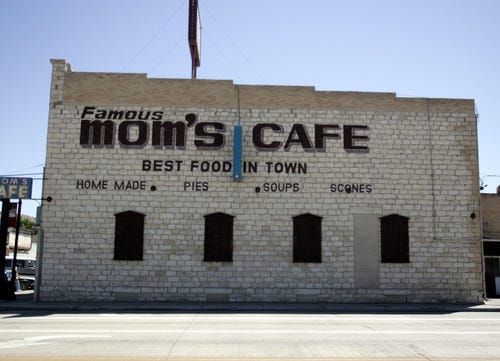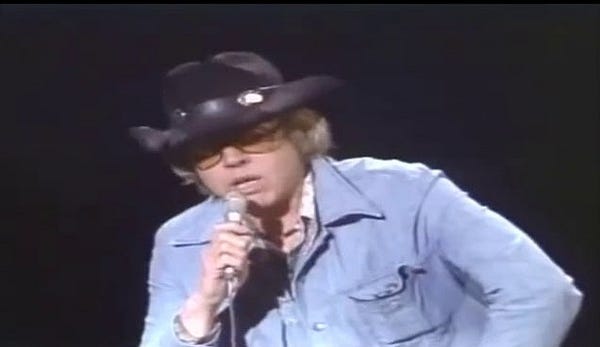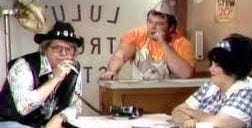C.W. McCall, Woody Guthrie and the Splendor of The American Road
For a variety of reasons, all of them in retrospect excellent, various friends and I used to drive around and across the country.
Gas was cheaper and cars had more personality a half century ago. But that wasn't why we did it. We were looking to find old records, see new places, visit distant friends, eat cheap regional foods and just look around America. It's a pretty impressive place.

Sometimes on these drives, like the one across Montana, we'd drive all night and sleep in shifts. This put the pressure on our sole source of musical entertainment, AM radio, to deliver the kind of songs that could keep a driver awake at 4:30 in the morning. You knew if you could make it to 5 o'clock, the sun would start rising and the radio would deliver the early morning gospel shows. Nothing sets up a new day better than hearing the Chuck Wagon Gang sing "I'll Fly Away."
At 4:30, it was not a guarantee that whatever you could pick up twisting the dial would be sufficiently invigorating. Fortunately, America had enough clear-channel 50,000-watt AM stations to mostly do that, and the fact that they favored country music was a bonus, because most country songs were melodic enough so they were easy to sing along with. A rousing sing-along is almost as effective as a cup of coffee for keeping your eyes open.
The only drawback is that, as I mentioned, we were sleeping in shifts, which meant singing too loudly was not always an act of kindness to the person trying to sleep.
I remember one evening somewhere in Oklahoma when Marge, who had been sleeping in the back seat, woke up and said, "When they played Dolly Parton ['I Will Always Love You'], I knew you would try to hit the high note. You almost did."
Anyhow, it all ties together: America, the road, cars, the night, country music. And for some reason, two country songs got superglued inside my head during those drives, and they've stayed there ever since.
The first is Bobby Bare's "Rosalie's Good Eats Café," from a wonderful double album Bare recorded of Shel Silverstein songs. While "Rosalie" isn't the best song there, it's unbeatable on midnight radio.
For one thing, the song is about midnight people, including a hippie who wanders into Rosalie's, orders a hamburger and discovers he only has 23 cents toward his 85-cent tab. The resolution: "He smiles at Rose and she winks back at him / Oh Lord, that's a high price to pay.. . ."
The other song is C.W. McCall's "Wolf Creek Pass." C.W. was best known for another song, "Convoy," but I always liked "Wolf Creek Pass," about a runaway truck carrying chickens that loses its brakes as it starts to descend Wolf Creek Pass in the Colorado Rockies.
 C.W. McCall
C.W. McCall
C.W. said it was based on a true story told to him by real-life truckers, and he makes the dilemma clear: "Earl, if you don't apply some brake real soon / They're gonna pick us up with a stick and a spoon."
But since we know they survived to tell the tale, the song veers off into colorful side details. Like this one: "Sign says clearance at the 12-foot line/ But them chickens was stacked up 13–9 / We took that top row of chickens off / Slicker than the scum on a Louisiana swamp."
For 47 years I have randomly recited that line at odd moments for no reason. I recited it earlier this week, which finally brings me to my point, which is that shortly thereafter I saw that C.W. McCall had died on Thursday.
The fact he was 93 at least enabled me to think he had led a long and I hoped pretty happy life. Which, in fact, it turns out he did.
C.W. McCall was actually Bill Fries Jr., who going into the 1970s was a middle-aged advertising executive with an agency in Omaha.
The agency was hired to create a spot for Old Home Bread and Bill proposed a song he had composed, which somehow in one minute told the story of a truck driver and a waitress and also made Old Home Bread seem like something you had to buy because the ad spot was so cool.
Its brilliance starts with the setting: The Old Home Fill-'Er Up and Keep On A-Truckin' Café. Does language get better than that?
Anyhow, the spot won a bunch of awards, as it should have. It was so popular the Omaha World newspaper included its airtimes in the TV listings. Fries recorded an extended version of the song, as C.W. McCall, and it reached №19 on the national country music charts.
That set him to writing more songs, in the same vein of good-natured humor, and one of the first was "Wolf Creek Pass."
"Convoy" was inspired by the furor in the trucker community over the imposition of a national 55 mile per hour speed limit. The idea was this would conserve gasoline, but truckers noted that some big rigs actually run more efficiently at 70, not to mention the fact that they get to their destination a lot faster.

"Convoy" is a primal scream for truck drivers, the triumphant unplanned convergence of hundreds of long-haul truckers whose cargos range from dynamite to hogs. The message is delivered more in laughs than fury, reflected in the fact the convoy is joined by, among others, a microbus full of long-haired Jesus lovers. .
After being tracked across the country by Smokies (short for Smokey the Bear; cops are "bears"), the convoy finishes up by blasting right through the final toll barrier. ("We crashed that gate doing 98 / I said, let them truckers roll 10–4.").
I remember asking a woman who worked at a police department in Iowa what the police thought of "Convoy." "They love it," she said.
"Convoy" reached №1 on the country and pop charts in 1975 and resurfaced as the title song for the movie Convoy in 1978. But while Fries cut several more albums, he didn't catch lightning again and after a couple of final songs about the Iran hostage crisis and the pine tar on George Brett's bat, he retired. Later he served six years as mayor of Ouray, Colorado, which is not near Wolf Creek Pass.
It wasn't pure beginner's luck, by the way, that Bill Fries wrote that first song. He grew up in a musical family, where his father Henry played the violin and his mother Imgard played the piano. That sounds classical, but they were half of the Fries Brothers Band, an old-time country-style string ensemble that Bill recalled playing around the country.
Imgard also taught young Bill the piano, and he considered music as a career before turning to TV production and then advertising, fields where he had more assurance of making a living.
 C.W. on "Hee Haw."
C.W. on "Hee Haw."
Still, he remained a music fan, and his favorites included Woody Guthrie. It was from Guthrie, he said, that he picked up the basics of what would become his songwriting style: a simple catchy melody with lyrics that could be recited as much as sung. Fun fact: His accompanist on all those songs was Chip Davis, who would go on to greater fame for founding Mannheim Steamroller.
In any case, while Bill Fries is hardly the only artist influenced by Woody Guthrie, the direction in which C.W. McCall took his Guthrie lessons reflects the breadth of the influence Guthrie had on America's musical culture.
It's that soundtrack of America thing. It stays with you.